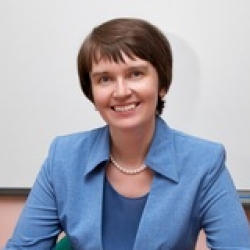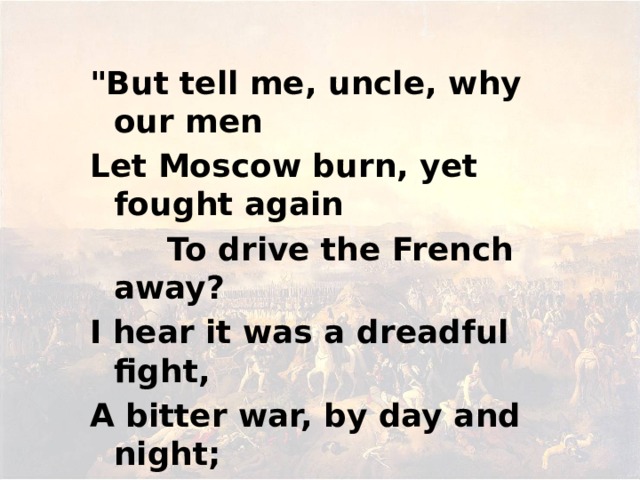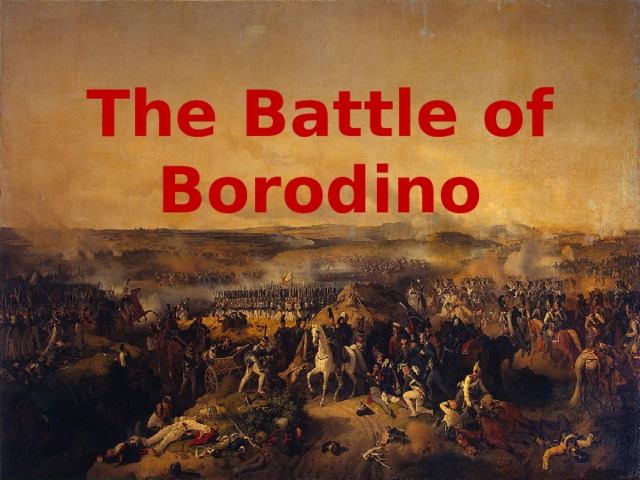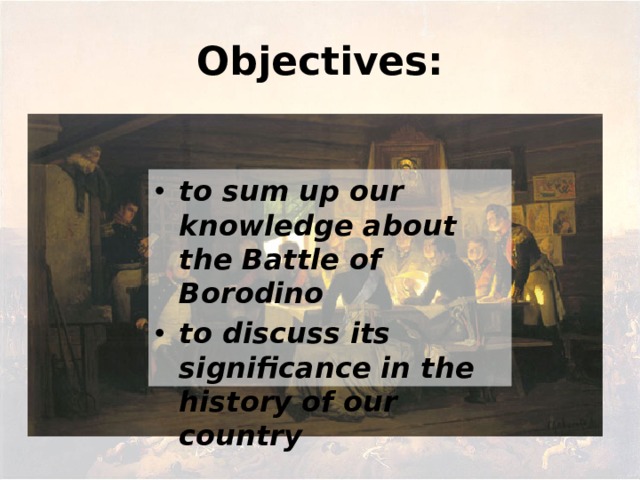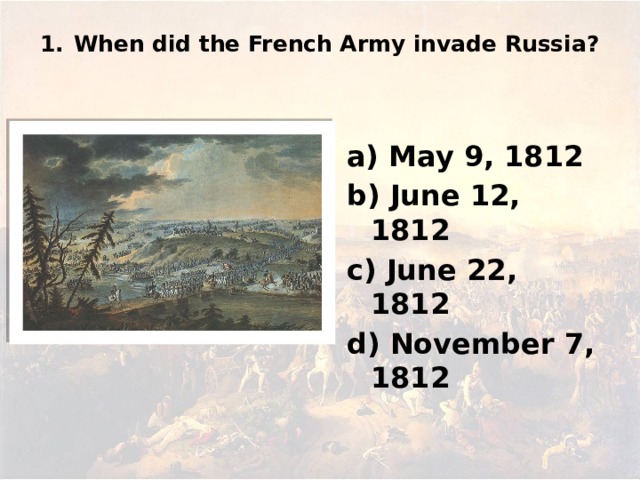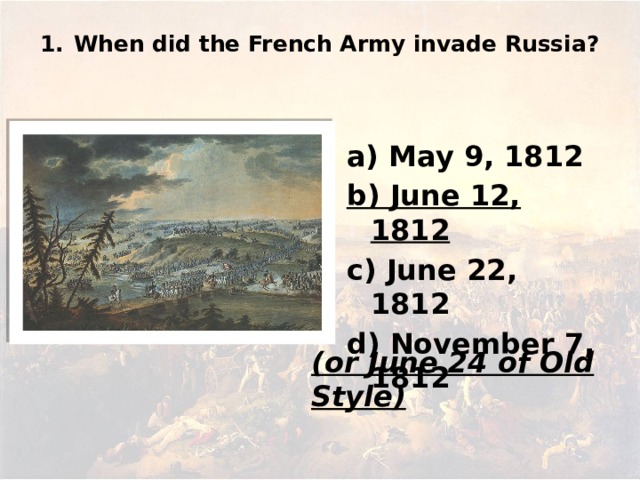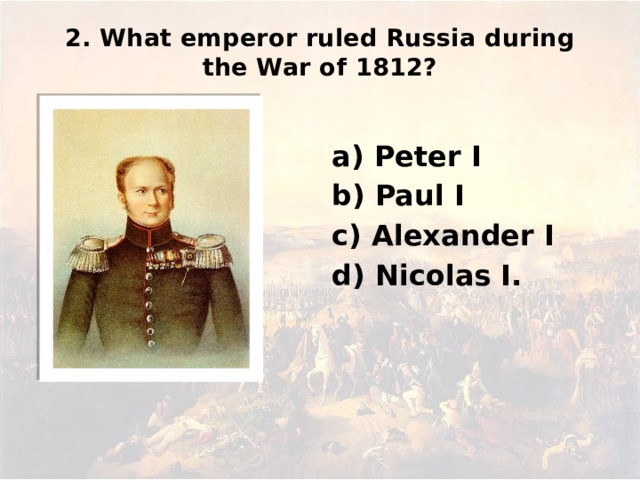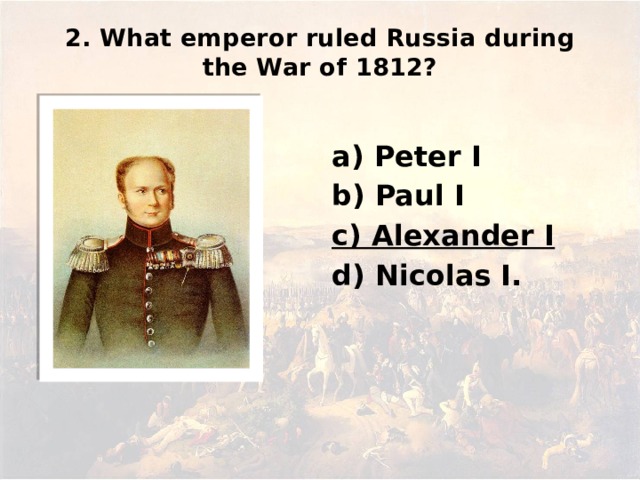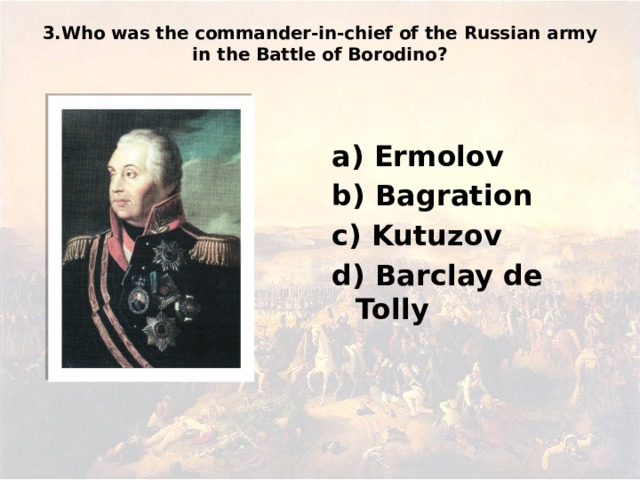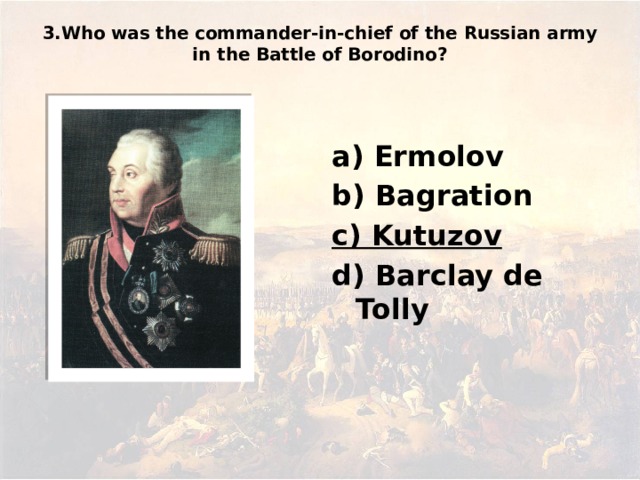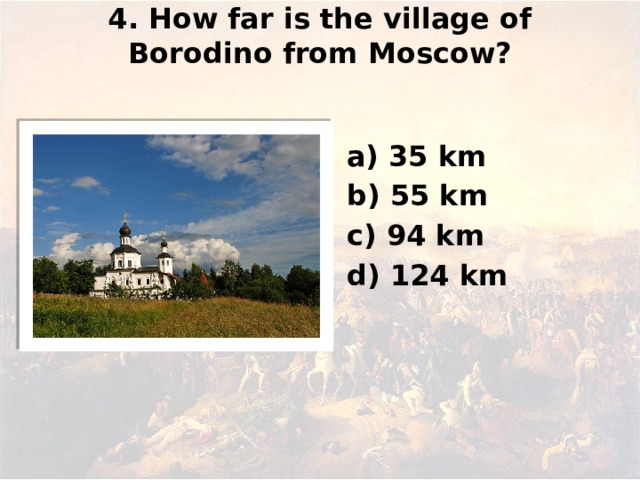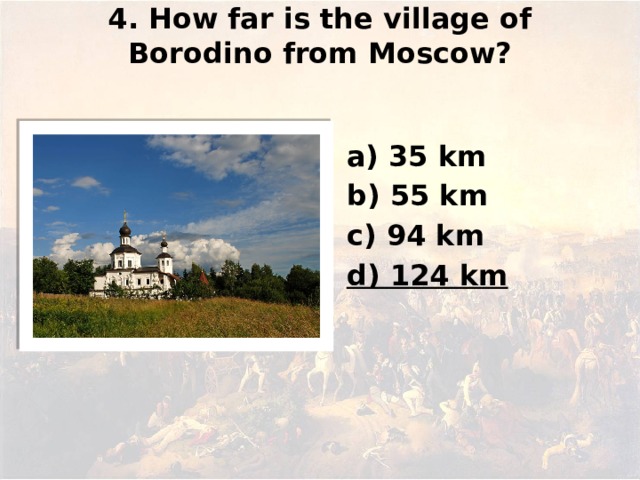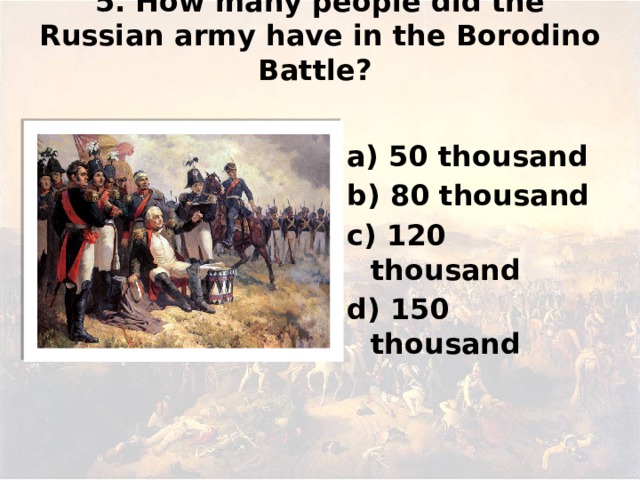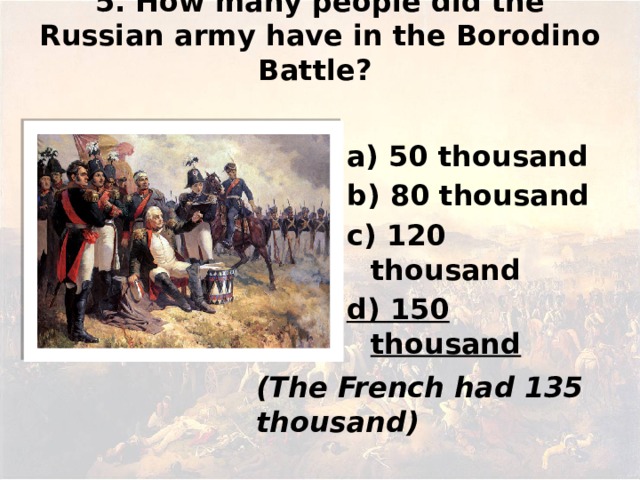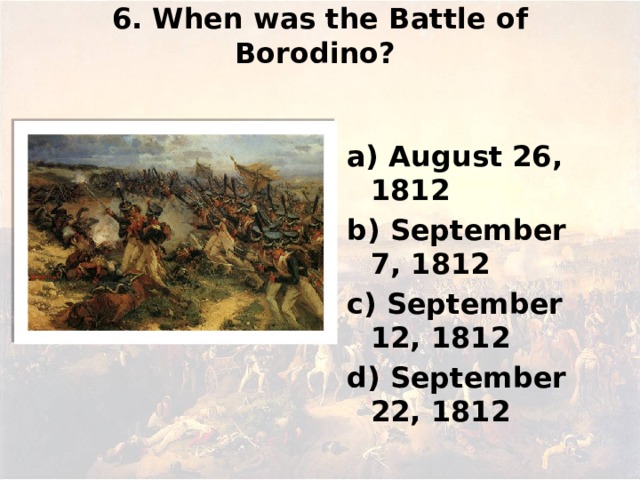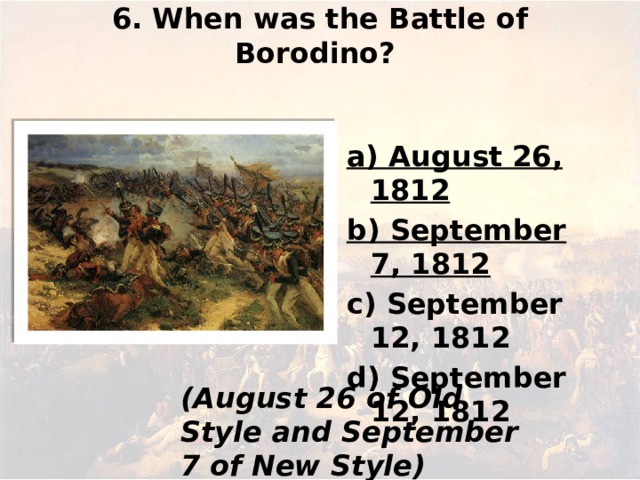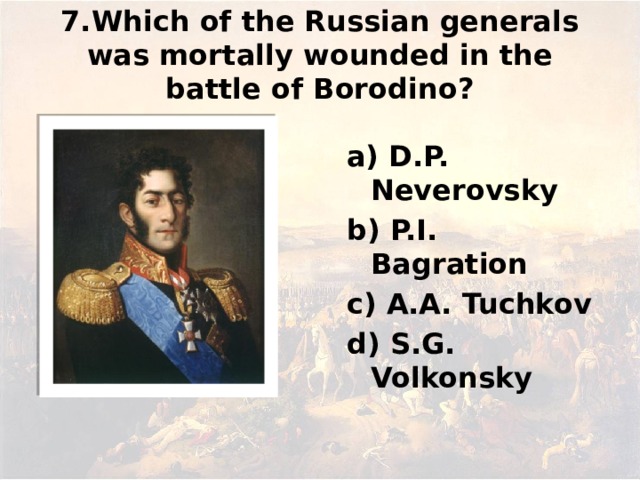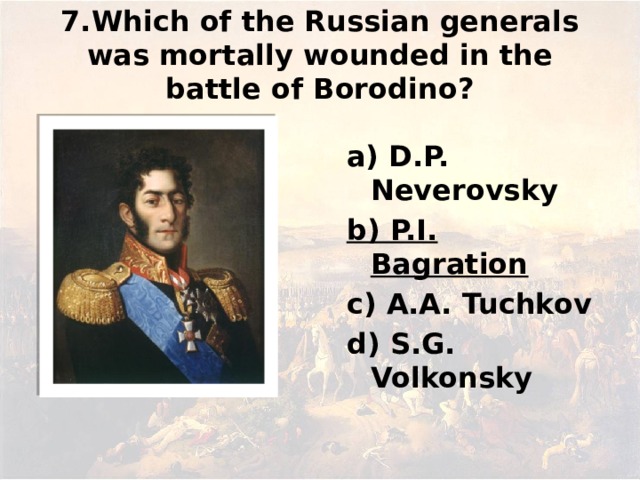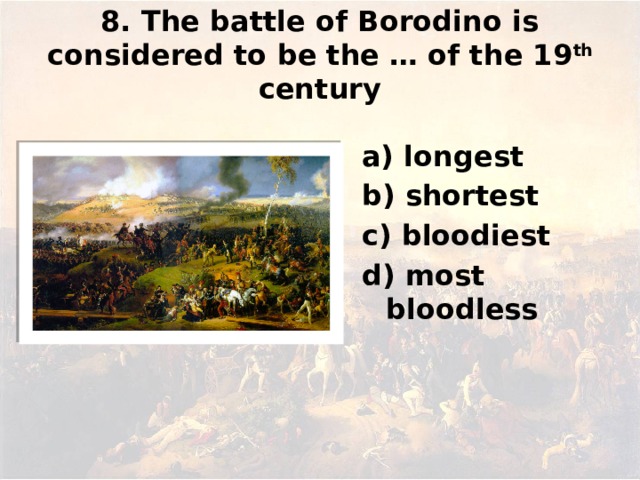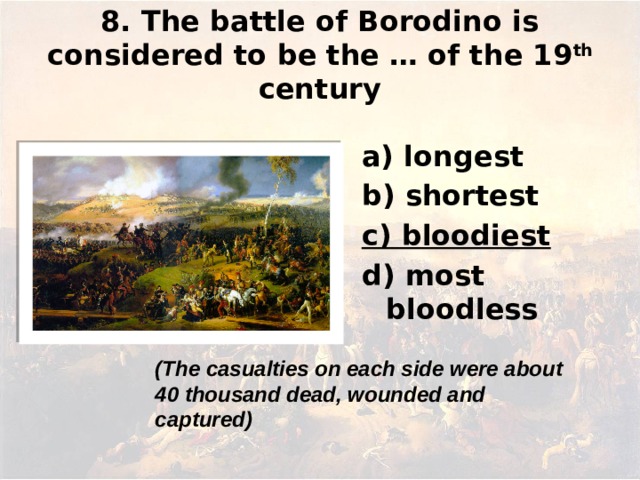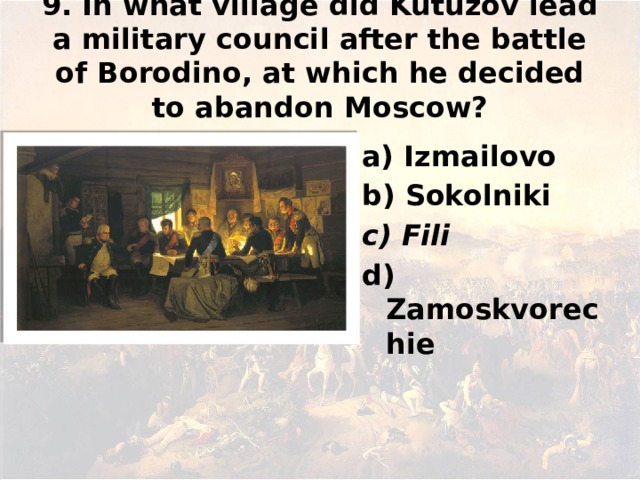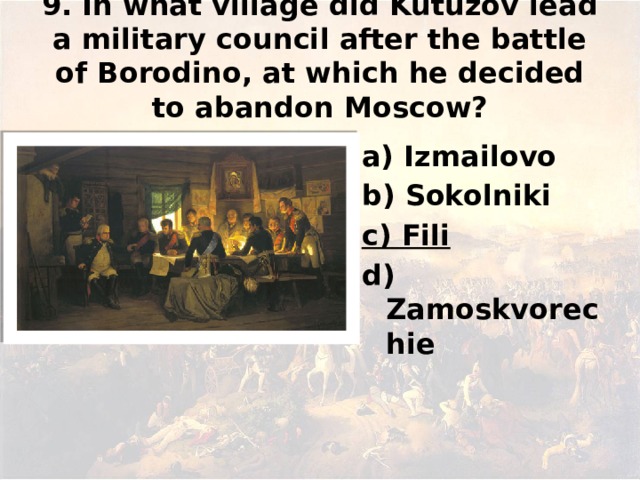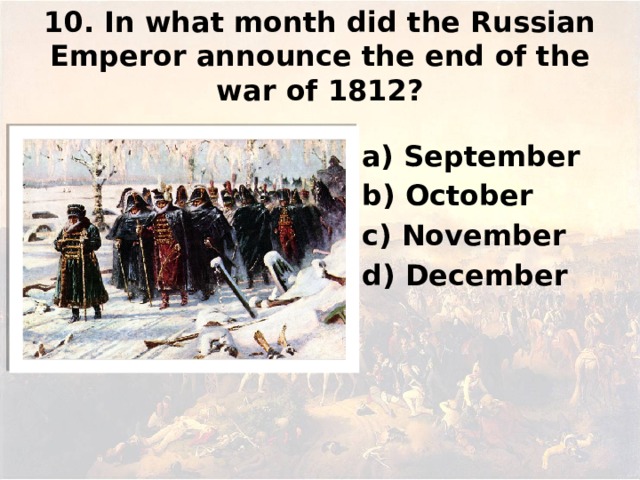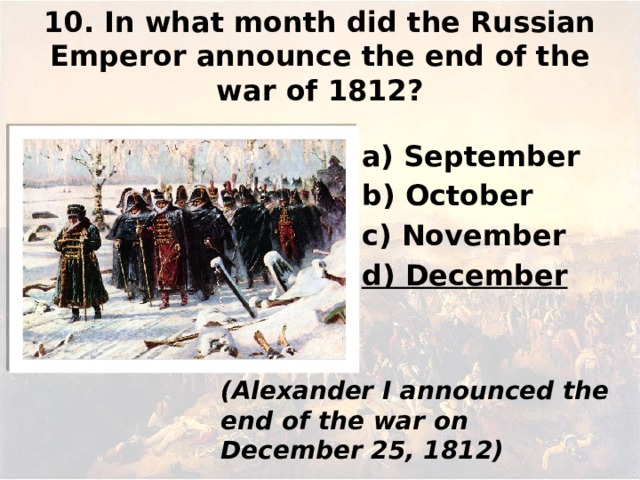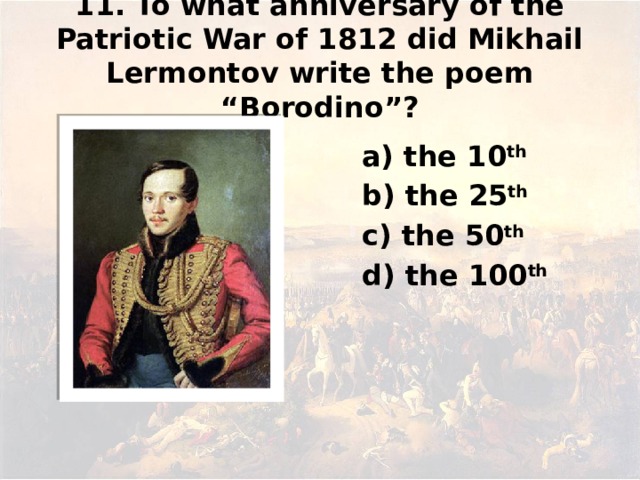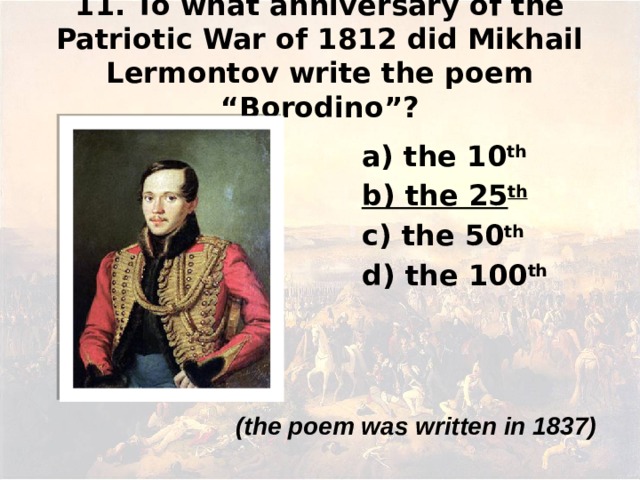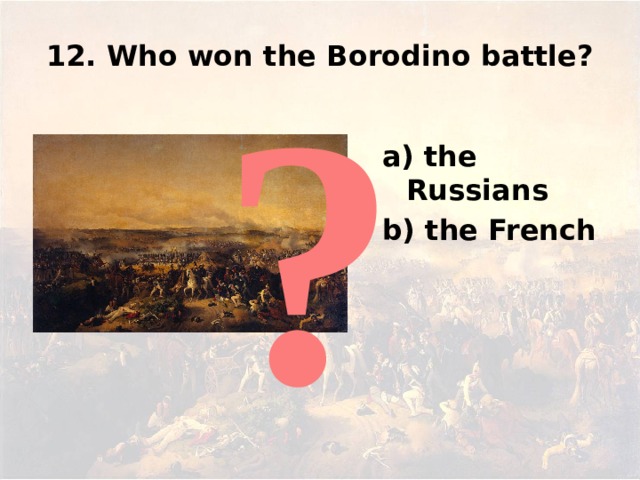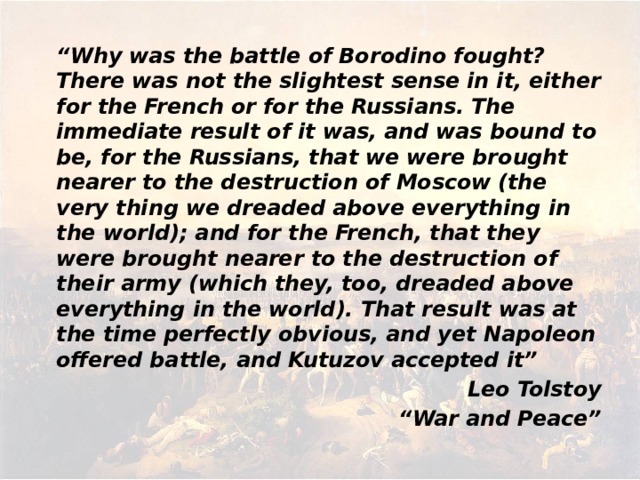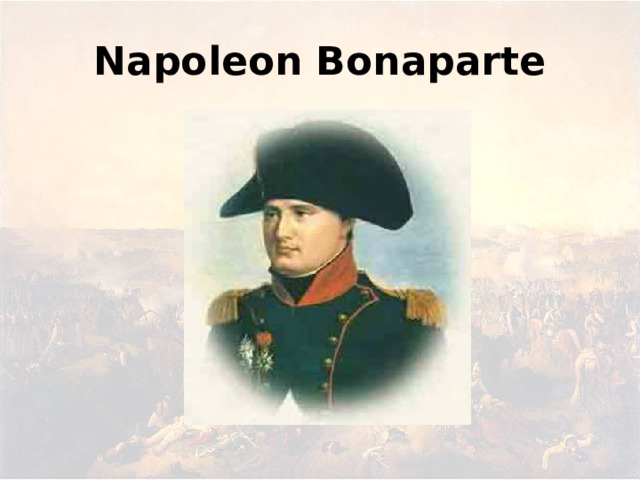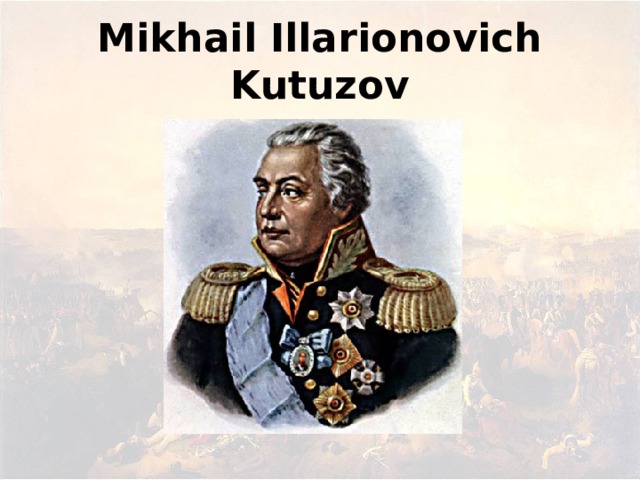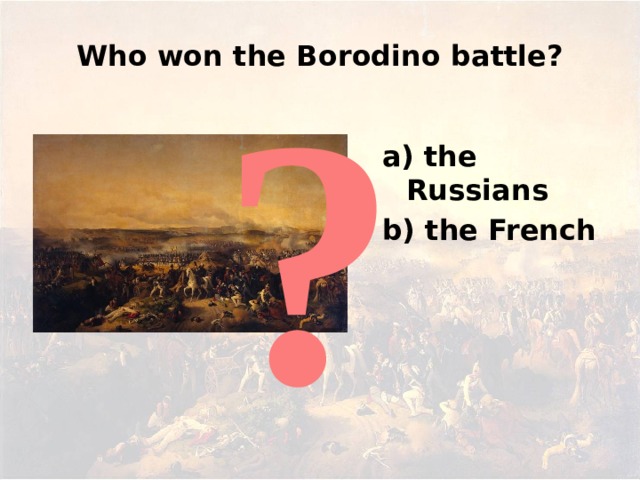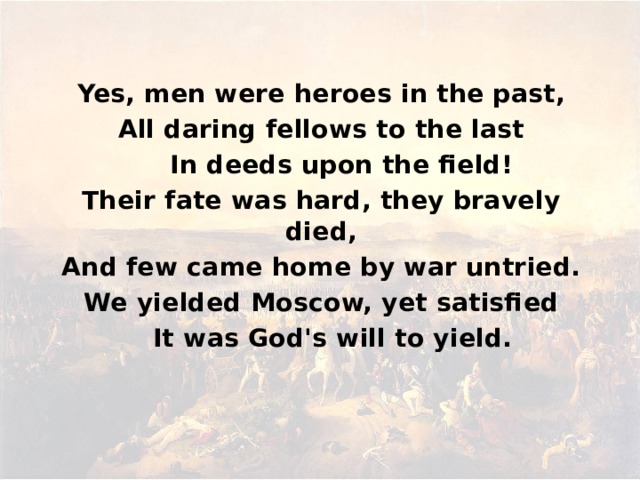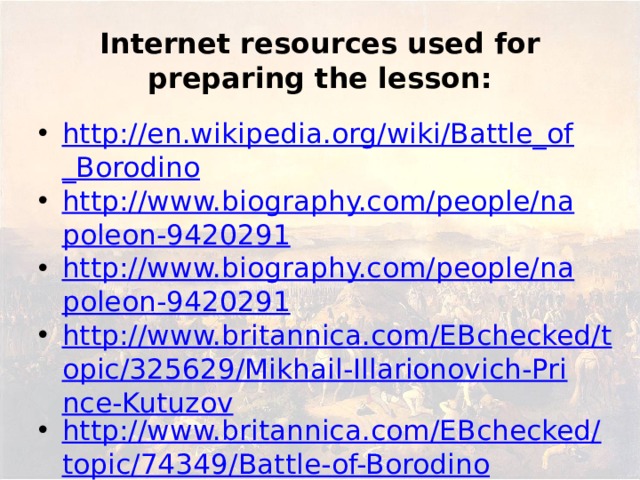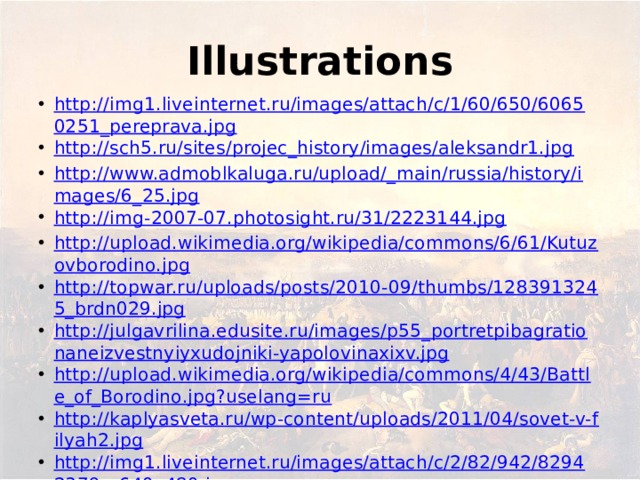Lesson Plan.
Topic: “The Battle of Borodino”
Level: Upper-Intermediate/Advanced
Form: 11th (aged 16-17)
Objectives:
The students will be able
to practice the vocabulary on the topic “Wars and Battles”
to develop communicative competence;
to develop listening skills;
to express and support their point of view;
to develop the skills of finding the necessary information;
To develop reading skills
to sum up and expand their knowledge about the Patriotic war of 1812
to realize the importance of the Battle of Borodino in the history of our Motherland
Stages:
Goal Setting.
Warming Up (History Quiz)
Group Work. True or False?
Information Gap Filling. Pair Work.
Listening Comprehension.
Deliberating
Homework
Summing Up.
Good morning, students. Today we are going to remember one of the most glorious pages in the Russian history. Listen to the English translation of a famous Russian poem and say what event we are going to speak about.
"But tell me, uncle, why our men
Let Moscow burn, yet fought again
To drive the French away?
I hear it was a dreadful fight,
A bitter war, by day and night;
That's why we celebrate the might
Of … (Borodino today)
(Students finish the line by guessing the name of the battle).
Yes, today we’ll talk about the battle of Borodino.
Our main objective today is to sum up our knowledge about this great event and to discuss its significance in the history of our country.
I believe you know a lot about the Borodino battle from the courses of history and literature. Now let’s do a short quiz to refresh our knowledge.
1. When did the French Army invade Russia?
а) May 9, 1812
b) June 12, 1812;
c) June 22, 1812;
d) November 7, 1812.
(24 June of Old Style.)
2. What emperor ruled Russia during the War of 1812?
а) Peter I;
b) Paul I;
c) Alexander I;
d) Nicolas I.
3.Who was the commander-in-chief of the Russian army in the Battle of Borodino?
а) Ermolov;
b) Bagration;
c) Kutuzov;
d) Barclay-de-Tolli.
4. How far is Borodino from Moscow?
а) 35 km;
b) 55 km;
c) 94 km;
d) 124 km
5. How many people did the Russian army have in the Borodino Battle?
а) 50 thousand;
b) 80 thousand;
c) 120 thousand;
d) 150 thousand.
(The French had 135 thousand.)
6. How long did the battle of Borodino last?
а) August 26, 1812
b) September 7, 1812
c) September 12, 1812
d) September 22, 1812
(August 26 of Old Style and September 7 of New Style)
7.Which of the Russian generals was mortally wounded in the battle of Borodino?
а) D.P. Neverovsky;
b) P.I. Bagration;
c) А.А. Tuchkov;
d) S.G. Volkonsky.
8. The battle of Borodino is considered to be the … of the 19th century
а) longest;
b) shortest;
c) bloodiest;
d) most bloodless.
(The casualties on each side were about 40 thousand dead, wounded and captured)
9. In what village did Kutuzov lead a military council after the battle of Borodino, at which he decided to abandon Moscow?
а) Izmailovo;
b) Sokolniki;
c) Fili;
d) Zamoskvorechie.
10. In what month did the Russian Emperor announce the end of the war of 1812?
а) September;
b) October;
c) November;
d) December.
(Alexander I announced the end of the war on December 25, 1812)
11. To what anniversary of the Patriotic War of 1812 did Mikhail Lermontov write the poem “Borodino”?
а) the 10th;
b) the 25th;
c) the 50th;
d) the 100th.
(the poem was written in 1837)
12. Who won the Borodino battle?
a) the Russians
b) the French
Different historians have different points of view; so it will be the question we’ll discuss and try to answer at our lesson.
“Why was the battle of Borodino fought? There was not the slightest sense in it, either for the French or for the Russians. The immediate result of it was, and was bound to be, for the Russians, that we were brought nearer to the destruction of Moscow (the very thing we dreaded above everything in the world); and for the French, that they were brought nearer to the destruction of their army (which they, too, dreaded above everything in the world). That result was at the time perfectly obvious, and yet Napoleon offered battle, and Kutuzov accepted it”
Maybe, to understand it better, we should know more about these two military leaders – Napoleon and Kutuzov.
Let’s watch a short video about the commander-in-chief of the French army.
http://www.biography.com/people/napoleon-9420291
After watching the video, you will work in groups of three and say if the following statements are true or false, correcting the false ones.
True or False?
Napoleon was born in Paris in 1769.
He got his education at a military school.
After the graduation Napoleon became the infantry lieutenant
Napoleon defended the king during the French revolution.
He commanded the whole French army at the age of 26.
Napoleon fought only in Europe.
He became the head of the country at the age of 30.
Everything Napoleon did was a disaster for France.
Napoleon was sent to St. Helena in 1815 by the Russians.
Napoleon died in exile on the isle of St. Helena.
Now work in pairs. There are two texts about Mikhail Illarionovich Kutuzov. read a text each and ask questions for more information.
Text A.
Mikhail Illarionovich, Prince Kutuzov, original name Mikhail Illarionovich Golenishchev-Kutuzov was born on Sept. 5 [Sept. 16, New Style], 1745 in St. Petersburg, Russia.
The son of a lieutenant general who had served in Peter the Great’s army, Kutuzov attended the military engineering school at age 12 and entered the Russian army as a corporal when he was only 14. He gained combat experience fighting in Poland (1764–69) and against the Turks (1770–74), and he learned strategic and tactical techniques from General Aleksandr Suvorov, whom he served for six years in the Crimea. He was promoted to colonel in 1777 and by 1784 had become a major general.
Although he had received a severe head wound and lost an eye in 1774, he actively participated in the Russo-Turkish War of 1787–91, in which he was again severely wounded. After the war he held a variety of high diplomatic and administrative posts, but he fell into disgrace in 1802 and retired to his country estate. When Russia joined the third coalition against Napoleon three years later, however, Emperor Alexander I recalled Kutuzov and gave him command of the joint Russian-Austrian army that opposed the French advance on Vienna. In the battle at Austerlitz (December 2) the Russian army suffered a disastrous defeat. Kutuzov was partly blamed for the disaster and was removed from his command. Subsequently Alexander returned Kutuzov to active duty as commander of an army in Moldavia after war had again broken out with Turkey. Kutuzov inflicted several defeats on the Turks and on May 28, 1812, concluded a Russo-Turkish peace settlement favourable to Russia.
Your partner has more facts about M.I.Kutuzov. Find out about:
the reasons Kutuzov was appointed commander-in-chief of the Russian army
Kutuzov’s strategy in the war with Napoleon
the way Kutuzov managed to destroy the French army
Kutuzov’s death
Say what new facts you have learned about Kutuzov from the text and the discussion with your partner.
Text B.
In June 1812 Napoleon’s army entered Russia, and the Russians fell back before him. Under pressure of public opinion, Alexander on August 9 appointed Kutuzov commander in chief of all the Russian forces and, on the following day, made him a prince. Napoleon sought a general engagement, but Kutuzov’s strategy was to wear down the French by incessant minor engagements while retreating and preserving his army. Under public pressure and against his better judgment, however, he fought a major battle at Borodino on September 7. Although the battle itself was inconclusive, Kutuzov withdrew to the southeast, allowing the French forces to enter Moscow.
Napoleon, having failed to make peace with the Russians and being unwilling to spend the winter in Moscow, left the city in October. He tried to move southwestward, but Kutuzov blocked his attempt to proceed along the fertile, southern route by giving battle at Maloyaroslavets (October 19). By forcing the disintegrating French army to leave Russia by the path it had devastated when it entered the country, Kutuzov destroyed his opponent without fighting another major battle. Kutuzov’s troops harried the retreating French, engaging them at Vyazma and Krasnoye, and the remnants of Napoleon’s army narrowly escaped annihilation at the crossing of the Berezina River in late November. In January 1813 Kutuzov pursued the French into Poland and Prussia, where he died of disease on April 16 [April 28], 1813.
Your partner has more facts about M.I.Kutuzov. Find out about:
date of birth
his education
his career
wars he took part in
Say what new facts you have learned about Kutuzov from the text and the discussion with your partner
Having learned more about the two military leaders, we are coming to the last question of our test – whose victory was it?
Let’s watch a video http://www.youtube.com/watch?v=dvP9Xbr2ZhE
which reflects one point of view on this issue. Get ready to explain this point of view. (stop at 1:30)
Now watch the video again and fill in the gaps in the following text:
The battle of Borodino is now one of the most … chapters in Russian military history, despite the fact that it was Napoleon’s army that … the day. They sustained considerably less … than the Tsar’s army. The Russian … opened the way for Napoleon’s entry into Moscow. Despite all appearances, Borodino was a Pyrrhic ….
Napoleon’s triumphant … into one of Europe’s most illustrious and important capitals was his immediate …, but it was a sour and … victory.
The Great Fire soon reduced Moscow to … and by mid-… the Grand army was reduced to a half-starved demoralized parody of its former self.
The battle of Borodino is now one of the most celebrated chapters in Russian military history, despite the fact that it was Napoleon’s army that won the day. They sustained considerably less casualties than the Tsar’s army. The Russian retreat opened the way for Napoleon’s entry into Moscow. Despite all appearances, Borodino was a Pyrrhic victory.
Napoleon’s triumphant entry into one of Europe’s most illustrious and important capitals was his immediate prize, but it was a sour and bitter victory.
The Great Fire soon reduced Moscow to ashes and by mid-November the Grand army was reduced to a half-starved demoralized parody of its former self.
Now, you will discuss this question and one side of the classroom should think of the arguments that it was the Russian army who won the battle of Borodino, and the second group should find the arguments against it. You’ve got one minute to discuss your arguments. Use the article from Wikipedia and Encyclopedia Britannica to corroborate your point of view. (Students use either computers or the printed versions of the articles)
Now I would like you to exchange your seats so that we have both people for and against in one group. Firstly, it’s the time for those who are for the Russian victory. The opposing team should listen and find the argument they agree with. (Then vice versa).
Now you’ve got one more minute to discuss this question in your groups and come to a conclusion taking into the consideration both points of view.
For your homework write an opinion essay on who the Battle of Borodino was won by.
All in all, though the Battle of Borodino may be called inconclusive, the victory of the Russian army in the war of 1812 is indisputable and the heroism of the Russian people in this war is unquestionable.
Yes, men were heroes in the past,
All daring fellows to the last
In deeds upon the field!
Their fate was hard, they bravely died,
And few came home by war untried.
We yielded Moscow, yet satisfied
It was God's will to yield.
Internet resources used for preparing the lesson:
http://en.wikipedia.org/wiki/Battle_of_Borodino
http://www.biography.com/people/napoleon-9420291
http://www.biography.com/people/napoleon-9420291
http://www.britannica.com/EBchecked/topic/325629/Mikhail-Illarionovich-Prince-Kutuzov
http://www.britannica.com/EBchecked/topic/74349/Battle-of-Borodino
http://www.youtube.com/watch?v=dvP9Xbr2ZhE
http://www.youtube.com/watch?v=dvP9Xbr2ZhE
http://zanimatika.narod.ru/RF_Borodino_viktorina.htm




